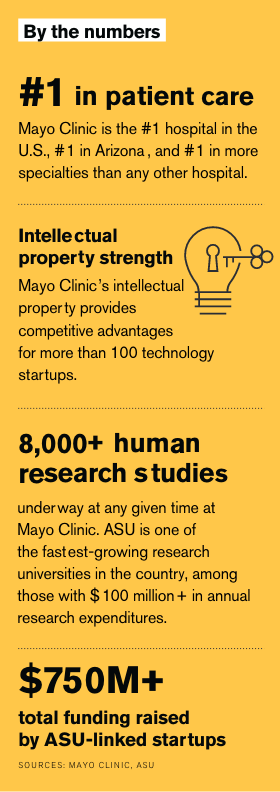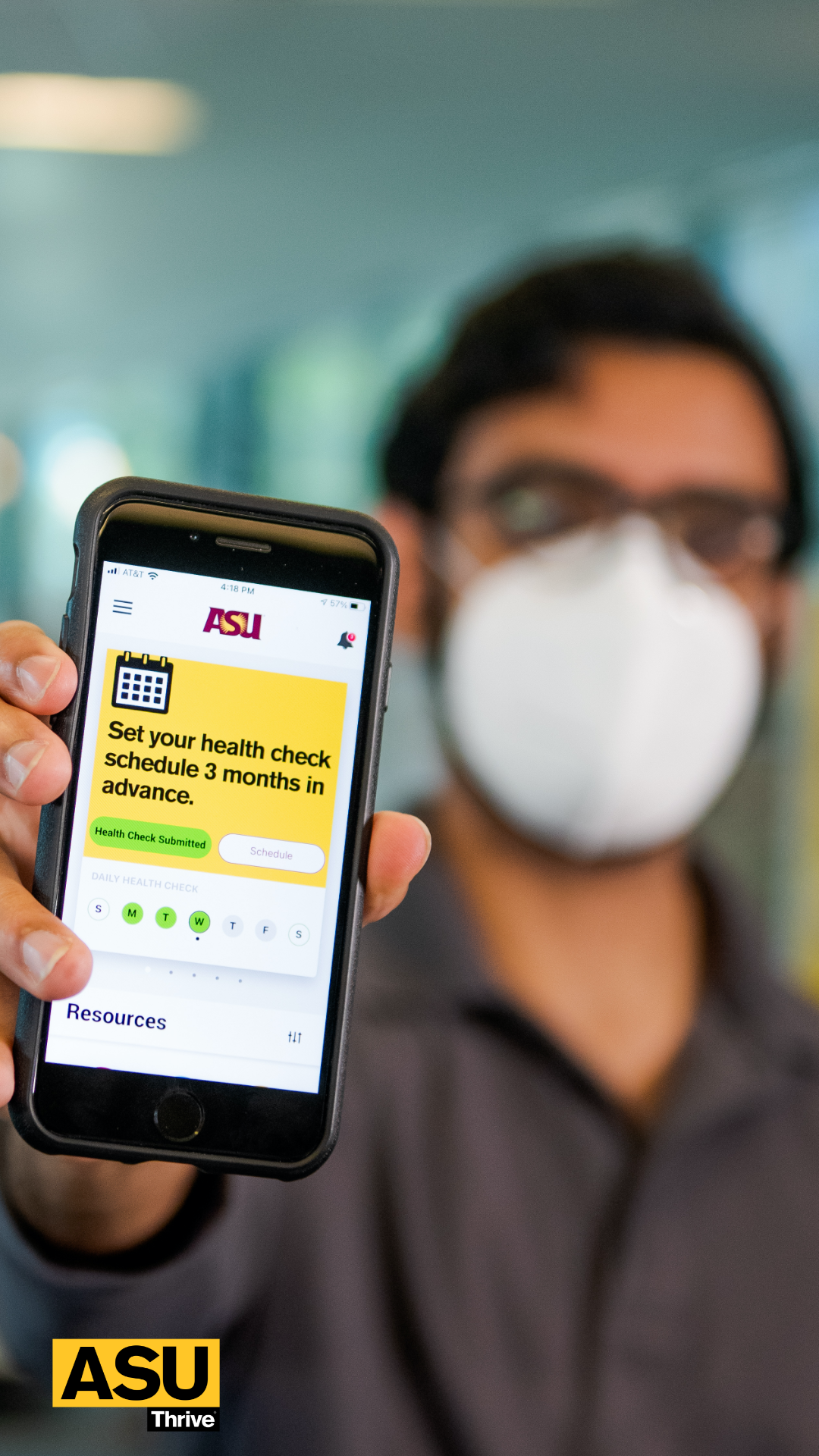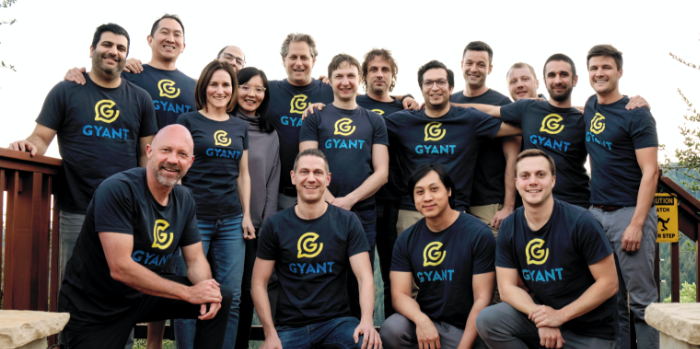Editor's note: This story originally appeared in the spring 2021 issue of ASU Thrive magazine.
The pain of a lingering sore throat is, in many cases, not just physical. On top of feeling unwell, people often have to enter the health care system to get relief. This often looks like: making a request to take time off work, finding an open appointment, sitting in traffic, filling out paperwork, enduring a throat swab and, finally, paying the bill.
Treating common illnesses — strep throat, urinary tract infections, influenza and now COVID-19 — could be more accessible and affordable, giving power to the consumer and reducing wasted spending in health care, argues Ken Mayer, founder of health technology company Safe Health Systems.
Based in Los Angeles, Safe Health Systems is working to disrupt the traditional approach for treating low-complexity illnesses by offering remote diagnostic and digital care services. In 2020, the company formed a venture offering digital provider services, AI-based care and remote and rapid diagnostic testing with Mayo Clinic through the Mayo Clinic and ASU MedTech Accelerator.
In the case of someone suffering from strep throat, the Safe platform would allow that person to find care, take a rapid diagnostic test and receive trusted results, from home. When Safe Health Systems launched in 2016, its scope was narrowly defined, focused exclusively on the rising sexually transmitted disease epidemic. The company created an app, Safely, that allows users to import STD test results and show their verified status privately on their phones.
Looking to scale the technology, Safe Health Systems turned to the Mayo Clinic and ASU MedTech Accelerator, an immersive two-week program followed by six to 12 months of continued mentoring, that began in 2019. The program helps early-stage medical device and health care technology companies level up through personalized feedback from clinicians and business leaders.
Six companies, including Safe Health Systems, were part of the inaugural cohort. As a participant in the Mayo Clinic and ASU MedTech Accelerator, Mayer was able to spend invaluable time with subject-matter experts, including Dr. Steven Lester, the program’s founder and medical director, and a Mayo Clinic cardiologist.
VIDEO: See how the accelerator works
Inspiration for the accelerator came to Lester and colleagues at ASU about four years ago, after Lester took on a new role in Mayo Clinic’s department of business development. One of the first people Lester connected with was Charlie Lewis, the accelerator’s co-founder and vice president of venture development and physical sciences at SkySong Innovations, an ASU spinoff that helps bring university inventions to the marketplace.
The two began discussing ways to make health care technology companies visible to the venture capital community, “to potentially fund some of these things, as well as getting in front of potential entrepreneurs that might be able to take these ideas and run with them in the form of launching a new startup,” Lewis said.
Lester and Lewis brought in other experts from ASU to help build this unique accelerator that combines access to Mayo Clinic’s world-class physicians and ASU’s entrepreneurial resources. The program includes individuals such as Ji Mi Choi, vice president, Knowledge Enterprise and founding executive director, the J. Orin Edson Entrepreneurship + Innovation Institute; Michael Harris, senior director of corporate development at Mayo Clinic and accelerator co-managing partner; Rick Hall, senior director of health innovation at ASU’s Edson College of Nursing and Health Innovation and accelerator co-managing partner; and Amy Woof, who serves as clinical operations program manager of Mayo Clinic and Arizona State University Alliance for Health Care.
The unique program will “help these companies to advance in the marketplace,” said Lewis, who is the program’s chief venture development officer.
The program is designed to help innovators navigate notoriously complex governmental medical regulations, while gaining support from established and sometimes reluctant-to-change health institutions.
Safe Health Systems’ digital care and remote diagnostic technology is currently deployed at several universities amid the pandemic, including ASU as the Daily Health Check app.
Touch points with Mayo Clinic and ASU experts
Another startup from the inaugural cohort, Securisyn Medical, used the experience to improve its interlocking breathing tube securement technology.
Securisyn co-founder Dr. Arthur Kanowitz, who spent many years as a medical director for ambulance and fire departments, is dedicated to solving a serious and preventable problem in medicine — tragedies related to unplanned extubations.
Smooth, plastic breathing tubes are typically secured by an adhesive tape that sticks to the patient’s face or a device that grips to the tube. But after encountering heat and moisture in the human body, the tubes can become slippery and unexpectedly slide out of an airway, potentially causing pneumonia, brain damage and even death.
In 2019, approximately 121,000 people experienced unplanned extubations, resulting in 33,000 deaths in the U.S. alone. These are also complications “that lead to over $4 billion a year in unnecessary health care costs to the system,” co-founder, CFO and COO Elyse Blazevich said.
Securisyn was still pre-revenue and pre-FDA clearance when it entered the accelerator with its original design — a series of ribs on the smooth, slippery surface of the breathing tube, allowing it to interlock with the securement device, creating a strong barrier against movement.
While participating in the accelerator, Blazevich estimates the company had more than 100 touch points with emergency room and critical care physicians, respiratory therapists and health care administrators, in addition to experts in supply chain issues and innovation, among others. These are connections that continue today, even as the product has evolved into a bolt-on accessory, where securement can be added to any endotracheal tube, regardless of where it’s placed or which manufacturer made it.

Participating in the program helped Securisyn evolve from a single invention — a device to better secure breathing tubes — to an expanded portfolio of products in various areas of health care.
This spring, Securisyn will begin clinical builds and is planning to move into full production next year. Broadening the scope of its product brings the company closer to its overarching goal: eliminating unplanned extubation and attaining zero preventable deaths.
Mayo Clinic’s decision to invest in Safe and Securisyn was motivated by its goal of helping companies transition to the next level, while also improving the health care system. Venture capitalists are typically driven by financial returns, Lester said. “When Mayo Clinic is investing, they’re fundamentally motivated by one thing — is this going to favorably impact the care of our patients and patients worldwide?”
Credibility with the industry
For Gyant, a health care technology company that was also part of the inaugural cohort, the Mayo Clinic and ASU MedTech Accelerator was essential in tackling one of the first hurdles as a startup: getting initial buy-in from the health care industry.
“You also participate in a way that gives you access to that first potential customer ... and that creates a level of institution trust that is really important to break into the industry,” said co-founder and CEO Stefan Behrens.
New to health care, Behrens and co-founder Pascal Zuta used their experience in the video game industry to develop an AI-based platform that works as a connective tissue between patients and their health system. The platform and virtual health care assistant appears on a hospital system’s website or app to chat with patients 24/7, guiding them to the proper care.
It keeps track of health histories and records, creating a personalized experience to perform basic tasks in the early stages of the patient journey.
“It reduces the staff hours needed to do mundane things,” Behrens said. “There’s such a shortage of qualified staff, everyone is burned out and worn thin, so if there’s anything we can do to reduce some of that burden and let a computer handle it, that’s a win for the health system.”
In the first week and a half of the accelerator, the Gyant team met with about 12 Mayo department heads of gastroenterology, radiology, emergency medicine and other disciplines, along with ASU professors in biomedical informatics and engineering. They also spent time with health care workers on the ground, such as nurses and technicians who could provide a different perspective on the product. In a single week, they figured out the type of solutions to pursue that would have normally taken months, Behrens said.
The accelerator was invaluable and forced Gyant to consider “how does (the platform) fit into the patient journey in a major health system and where does it create value for the health system, so that they would be willing to adopt something like this,” Behrens said.
Solving pressing needs
Nearly two years after participating in the Mayo Clinic and ASU MedTech Accelerator, Safe Health Systems, Securisyn and Gyant are making a significant impact on patient and health care workers’ lives.
Securisyn spent 2020 testing its core breathing tube securement device with several institutions that gave the company validation of the product’s usefulness.
Because of participation in the Mayo Clinic and ASU MedTech Accelerator, in a single week the Gyant team was able to figure out what solutions to pursue for success. Photo courtesy of Gyant
Gyant is handling 60,000 patient interactions every day at hospitals. Gyant’s COVID-19 Screener and Emergency Response Assistant, which offers educational content on coronavirus and virtual screenings via chatbots, has been used by 25 payer and health system customers and 500,000 patients.
Safe Health’s digital care and remote diagnostic technology is currently deployed at several universities amid the pandemic, including ASU as the Daily Health Check app, for daily self-assessment and health status verification. Its vaccine care tool will support distribution and verification in the coming months.
As the Mayo Clinic and ASU MedTech Accelerator prepares for its second cohort in the spring, the team looks forward to working with even more companies that have original solutions to health care’s most challenging needs. Addressing these pressing issues is about originality, creativity and thinking of new ways to provide better care to patients, Lester said.
“It’s about finding people that want to continue to move forward and embrace the unknown and uncertain, and have that optimistic belief that there are really always solutions, just as long as one searches for opportunities to achieve them,” Lester said.
About the Mayo Clinic and ASU Alliance for Health Care
The Mayo Clinic and ASU Alliance for Health Care is the university’s most transformative collaboration. Formalized by a signed memorandum of understanding in 2016, the alliance continues to develop comprehensive improvements in the science of health care delivery and practice, all toward one goal: continually advancing patient care. Together the recognized world leader in patient care, education and research, and the nation’s No. 1 ranked university for innovation are combining expertise from every corner of health care – doctors to bioengineers to business experts – for an adaptive approach to preparing the next generation of health care pioneers and practitioners in our communities.
Story by Makeda Easter. A staff writer at the Los Angeles Times, Easter covers the arts. When not writing, she can be found in a dance studio taking a class or in rehearsal for an upcoming show. She previously was a science writer for a supercomputing center at the University of Texas.
More Health and medicine

Reducing waste in medical settings
Health care saves lives, but at what cost? Current health care practices might be creating a large carbon footprint, according to ASU Online student Dr. Michele Domico, who says a healthier…

ASU offers bilingual counseling to Spanish speakers
Arizona is one of the five states in the nation with the highest percentage of Hispanic residents, according to the U.S. Department of Health and Human Services Office of Minority Health, and …

College of Health Solutions launches first-of-its-kind diagnostics industry partnership to train the workforce of tomorrow
From 2007 to 2022, cytotechnology certification examinees diminished from 246 to 109 per year. With only 19 programs in the United States, the cytology workforce that stands at the front line of…




